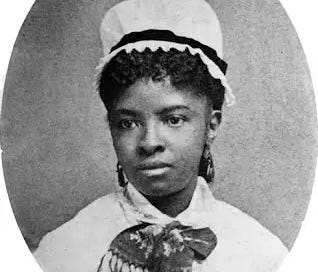Today In Black History
Mary Eliza Mahoney, 1st Black person to be awarded a U.S. Nursing License
Issue #535 Today In Black History, Monday, March 18, 2024
Today’s Black History WOW!
Mary Eliza Mahoney was born in 1845 in Boston, Massachusetts to freed slaves who had moved to Boston from North Carolina. She was educated at Phillips School in Boston, which after 1855, became one of the first integrated schools in the country.
When she was in her teens, Mahoney began working at the New England Hospital for Women and Children. The hospital was dedicated to providing healthcare only to women and their children. It was also exceptional because it had an all-women staff of physicians. Mahoney worked there for 15 years and had the opportunity to work as a nurse’s aide, enabling her to learn a great deal about the nursing profession.
The New England Hospital for Women and Children operated one of the first nursing schools in the United States. In 1878, at the age of 33, Mahoney was admitted to the hospital’s professional graduate school for nursing. The program, which ran for 16 months, was intensive. Of the 42 students who entered the program in 1878, only four completed it in 1879. Mahoney was one of the women who finished the program, making her the first African American in the US to earn a professional nursing license.
After she finished her training, Mahoney decided not to follow a career in public nursing due to the overwhelming discrimination often encountered there. Instead, she pursued a career as a private nurse to focus on the care needs of individual clients. Her patients were mostly from wealthy white families, who lived up and down the east coast. She was known for her efficiency, patience, and caring bedside manner.
In 1896, she joined the Nurses Associated Alumnae of the United States and Canada (NAAUSC), which later became known as the American Nurses Association (ANA). The NAAUSC consisted mainly of white members, which were not always welcoming to Black nurses. Mahoney felt that a group was needed that advocated for the equality of African American nurses.
In 1908, she co-founded the National Association of Colored Graduate Nurses (NACGN). In the following year, at the NACGN’s first national convention, she gave the opening speech. At the convention, the organization’s members elected Mahoney to be the national chaplain and gave her a life membership.
After decades as a private nurse, Mahoney became the director of the Howard Orphanage Asylum for Black children in Kings Park, Long Island in New York City. She served as the director from 1911 until 1912.
After 40 years in the profession, Mahoney retired from nursing. However, she continued to champion women’s rights. After the 19th Amendment was ratified in August 1920, Mahoney was among the first women who registered to vote in Boston.
Mahoney died of breast cancer on January 4, 1926. She is buried in Woodlawn Cemetery in Everett, Massachusetts.
Mahoney has been recognized with numerous awards and memorials. In 1936, the National Association for Colored Graduate Nurses founded the Mary Mahoney Award in honor of her achievements. This award is given to nurses or groups of nurses who promote integration within their field. The award continues to be awarded today by the American Nurses Association.
The ANA further honored Mahoney in 1976 by inducting her into their Hall of Fame. In 1993 she was inducted into the National Women’s Hall of Fame in Seneca Falls, New York.
Today In Black History
- In 1865, the Congress of the Confederate States of America adjourned for the last time.
- In 1877, President Rutherford B. Hayes appointed Frederick Douglass as Marshal of the District of Columbia. Douglass became the first Black person to receive a major U.S. government appointment.
- In 1879, the 46th Congress convened with Blanche K. Bruce as the Black Senator from Mississippi.
- In 1895, 200 Black people left Savannah, Georgia to settle in Liberia.
- In 1972, the USS Jesse L. Brown, the first U.S. naval ship to be named for an African American naval officer, was launched.
- The “Comments” feature has been disabled. Instead, let’s discuss these facts in our community on Substack Notes. You can also read other Substack publications without subscribing to them when you join Notes.
This post is free to read/listen to for three days after publication. To have 365 24/7 access to all our posts and podcast episodes and financially support “We Are Speaking” for no more than $5 per month, please subscribe at the paid level. You will receive a 7-day FREE trial!






